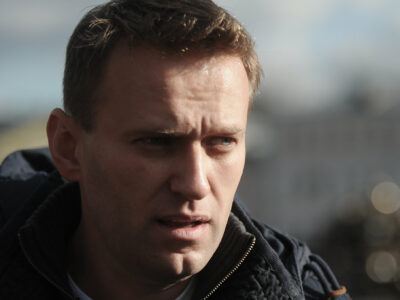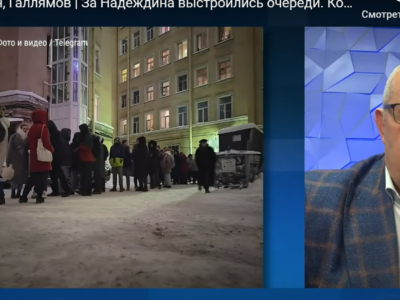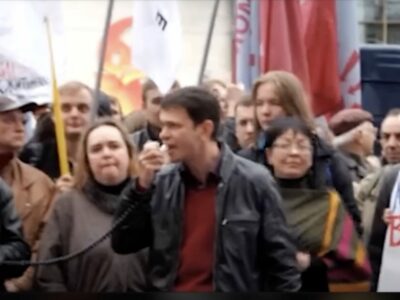
A cartoon titled “Keep the fight alive!” The artist badiucao made to honor Navalny
On February 16, the Russian Federal Penitentiary System (FSIN) announced the death of Aleksey Navalny, a prominent figure who openly challenged Russia’s president Vladimir Putin for many years, and pointed out examples of large-scale corruption and major violations of Russian and international law.
Navalny’s death reminded the world that Russia still has an opposition after over two decades of rule by the same person. Putin started his top political career in December 1999 and has served as President or Prime Minister since — just over a quarter of a century. There is a popular expression in Russia saying that there are probably no cats left in Russia that were born before Putin started leading and dominating the country.
But Navalny is not the only face of the opposition to Putin, whether inside or outside of Russia, and he remains a very divisive and controversial figure in Russia’s political life of the 21st century, as well as in neighboring partially Russophone countries and exile communities from those countries.
There is little doubt Navalny was, in effect, killed by Putin’s system of repression, arrests, torture, and absolute disregard for Russia’s rule of law, whether because of direct or indirect causes. Navalny was also poisoned by Russian secret agents during a flight in Russia in August 2020. After being evacuated to Germany to be cured, he decided to return to Russia in January 2021, deciding exile was not an option for him. He made this choice knowing perfectly well he would be immediately detained. Since his death, his widow, Yulia Navalnaya, has called for a full investigation to expose what happened inside the Russian prison where he was kept and also announced she will continue her husband’s mission and work from outside Russia.
Perhaps she will be more sensitive to issues that have made — and continue to make — Navalny and his legacy problematic for large numbers of people also opposing Putin.
For years, Navalny voluntarily joined what is called the “Russian March,” a demonstration taking place across Russia with the approval of the government and dominated by right to extreme-right and neo-nazi groups demonizing and threatening LGBTQ+ community members and migrant workers who come mostly from the South Caucasus and Central Asia in Russia. Over time, Navalny shared multiple statements ridiculing and mocking the people and culture of those regions and opposing their presence in Russia though they play a key role in its economy.
Similarly, until very recently, Navalny and his team never gave clear statements about their views on whether Crimea belongs to Ukraine or Russia. He himself stated in 2014 that Crimea belongs to Russia. Navalny’s clarification came as late as January 2023 — nearly a year after Russia's most recent invasion — when he stated Ukraine should remain in its 1991 international borders. He also supported Russia’s invasion of Georgia in 2008, though he later apologized for it in 2023.
While clearly an opponent to Putin who paid with his life, Navalny’s discourse is symptomatic of the narratives shared by many of the leaders of the more visible opposition to Putin: They are ethnic Russian men who adopt Russian colonialist attitudes, whether they believe them or find them useful to appear more mainstream and continue to disregard non-ethnic Russian voices, women leaders, and other groups. Over 19 percent of Russian citizens are non-ethnic Russians and regularly demonstrate across their country against Putin’s policies threatening their cultures, languages, but also because of Russia’s full-fledged invasion of Ukraine.
This special coverage focuses on Navalny’s death and its aftermath but also on the many other voices inside and outside of Russia. People of different genders, ethnic origins, and political affiliations, and those not living in the top cities of Moscow and Saint-Petersburg, continue to oppose Putin’s dictatorship and oligarchy despite the extremely high risks associated with this opposition, including outside of Russia.
Stories about Opposing Putin: A multitude of voices
Turning point? The ethnicization of social issues and what Indigenous communities think about it in Russia
Research by Vlada Baranova claims that the war in Ukraine has led to the ethnicization of conflicts and confrontation between the federal authorities, perceived as “Russian,” and the Indigenous population.
Lotteries, dressed-up figures, and other peculiar entertainment at Putin's sham elections
Current regime needs people to come to the polls in order to show the regime's legitimacy inside the country. Authorities find ways of 'entertainment' that would attract people to vote.
New song titled ‘Mom has a Secret’ features mothers from Russia who are anti-war activists
All of the women featured in the video for the song, as well as Monetochka herself, are mothers but also high profile activists who oppose the war and the regime.
Yulia Navalnaya against Vladimir Putin
But who is Yulia Navalnaya? She has a familiar face: Alexey's participated in a lot of his rallies, was by his side when he was poisoned.
Anger and grief as Russians in Armenia and Georgia mourn Navalny’s death
At the time of writing this story, at least 387 people have been detained at events across 39 Russian cities since Navalny's death, according to the Russian human rights group OVD-Info.
‘My message in case I am killed: Do not give up': Alexey Navalny predicted his own demise
"Navalny’s death was a murder — a planned murder, a murder methodically carried out, a murder of which the Russian state is guilty."
Hundreds of thousands supported anti-war candidate in Russia but he was banned from elections
Boris Nadezhdin and Yekaterina Duntsova happened to be the main figures of the Russian elections in March 2024, although neither of them are going to be on the ballot
The battle of Bashkir people: Why the largest protests in wartime Russia happened in Bashkortostan
"Russia is stepping on ethnic rakes. The Bashkirs have their own land. At the heart of everything that happened is a word that is now distorted — patriotism."
Documentary about the protest of soldiers’ wives, sisters and mothers created in Russia
Women demanding 'demobilisation' say: "Our topic, it's kind of forbidden. Do you understand? I'm scared to say what I think. I'm scared that I might never see my husband again."
The descendants of Buryat migrants in Mongolia have no feelings towards Russia
The Buryats left the Soviet Union for Mongolia in three waves in the beginning of the 20th century.
Russian musicians sing about war resistance — few people take them seriously
Through the musical project “We Exist” that premieres on December 12, anti-war artists oppose the narrative of Russian war resistance as a marginal point of view.
Russian artist Alexandra Skochilenko addresses the court in Saint Petersburg at her trial over anti-war messages
"My trial, widely followed in Russia and globally, will make history, regardless of the verdict. You're not judging a terrorist, extremist, or even a political activist. You're judging a pacifist."
Casual racism in Russia's everyday life: ‘Even though you are Buryat, you are still one of us’
Hurtful stereotypes can create actual barriers between people, fuel division and animosity. Stereotypes about an ethnic minority living in Russia, Buryats, are a vivid example of these negative social processes
Yelena Trifonova: ‘In Siberia, calling someone “Muscovite” is almost an insult’
"Independent journalism will persist as long as there's a demand for it in Russia. We cannot abandon people; because it’s the same as abandoning hostages," says the editor of Baikal People.
How Russians fought Putinism: A documentary
It is incorrect to say that the people in Russia did not resist the emergence of Putinism — they resisted, many times and in many ways, albeit unsuccessfully.
Yakut movie ‘Aita’ was censored in Russia
The reason Roskomnadzor cited was that the movie attempted to break the 'principles of the unity of the peoples of Russia.'
‘Please hate the terrorist state’: Trans people and allies speak up against a transphobic law in Russia
A group of anonymous activists who call themselves The Ural Queer Republic, from the Russian city of Ekaterinburg, announced an action and launched Twitter and Telegram channels before the approval of the law.
Russian Nobel laureate Dmitry Muratov: ‘Repression occurs when no one knows who might be targeted tonight’
"So who is opposing this potential junta, these armed people? Paradoxically, only the ability to speak the truth can stand up to armed men vying for power."
Russia arrests anti-war poet, claims terrorism charges for a theatre play
This is the first case of detention for a play in today's Russia. Prison sentences on charges for "publicly justifying terrorism" involve five to seven years in prison.
Russian decolonisation and Eurasia: An imperial legacy? Risks and opportunities for Tatarstan
Public attention to political and economic inequality in Russia’s regions, stirred by the debate on decolonisation, represents a welcome and much-needed development
Crimean Tatars are among the most politically persecuted groups in Russia
This oppressive campaign is a part of a broader effort by the authorities to repress the Crimean Tatar community, whom they consider political opponents























